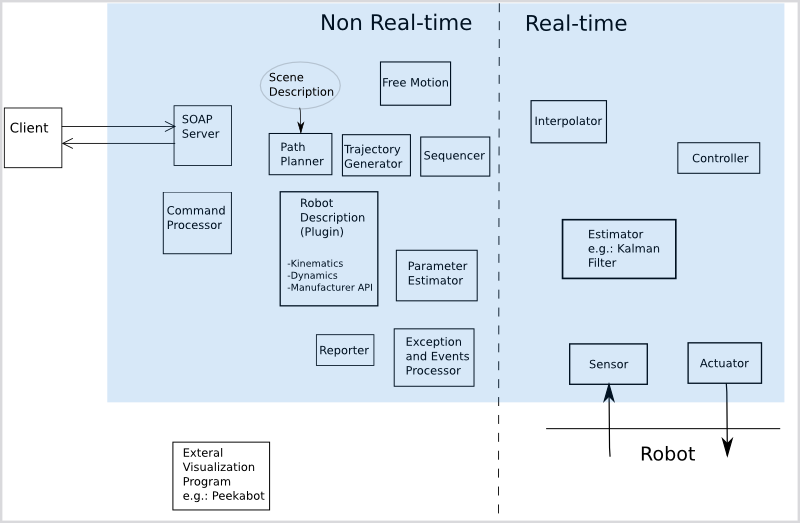Design Overview
The 'TaskContext' as a functional building block
Sarathi is composed of numerous Orocos Taskcontexts. A full description of an Orocos Taskcontext (henceforth abbreviated to 'TC') can be found in the Orocos documentation. For our purposes, it is enough to think of an Orocos TC as a software 'blob' that executes either periodically or non-periodically. Each TC can emit events and react to events emitted by other TCs. Furthermore, a TC provides functions which can either be executed in the thread of the calling TC (in Orocos terminology, these are called the 'Methods' of a Taskcontext) OR in the thread of the TC which defines the function (in Orocos terminology, these are called the 'Commands' of a Taskcontext). Methods are executed immediately when they are called (in the caller's thread) while Commands are queued up and run when the TC which defines the command is executed. Finally, each TC can have any number of buffered and unbuffered data ports, which can be connected to data ports of other TCs. These data ports can hold any type of data.
TCs can be turned 'ON' or 'OFF' by other TCs.
A distinct piece of functionality (for example, a path planner) can be executed inside a TC, whose periodicity, Methods, Commands and Data ports can be configured as necessary, for that functionality. Further, the TC can load its functionality from a plugin. Consider again, a path planner: Different planning algorithms can be implemented in different plugins and the planning TC can load a user-configured plugin at runtime. This makes it easy to swap out/in plugins without restarting/recompiling the system.
TaskContexts within the Sarathi system
The TCs within the Sarathi system are shown in figure1 below. This architecture is largely inspired by the design patterns described in The real-time motion control core of the Orocos project by Bruyninckx, H. et al
Functions of each TC are described below:
- SOAP Server: A non-periodic taskcontext responsible for managing communication with clients using SOAP messages. Forwards command requests to the Command processor
- Command Processor: A periodic taskcontext which executes commands received from the SOAP server (and optionally from other taskcontexts)
- Path Planner: Aperiodic. Upon receiving a goal position, the planner plans a path from current position to goal position. The result of a successful planning run is a set of key configurations which must be successively attained in order to reach the goal in a collision free manner. The path planner needs a scene description, which describes the robot and the obstacles in its environment.
- Trajectory Generator: Aperiodic. The path planner outputs a set of key points, without any consideration of the time at which each point is to be reached. Such a set of points, without any timing information is called a “path”. The trajectory generator imposes timing constraints which define the time at which each key point must be reached. The output of the trajectory generator is a set of keypoints, where each keypoint is associated with a time when it should be reached. This is called a “trajectory”
- Sequencer: (TBD: Periodic or aperiodic) This evaluates whether the generated trajectory is being executed as expected, and makes corrections if it is not so. The evaluation involves evaluation of application specific conditions and uses the output of the Trajectory Generator and the realtime and non-realtime estimators.
- Interpolator: Periodic. Generates a motion set-point every time it executes. Could use different methods like cubic splines, trapezoidal profiling etc.
- Estimator: Periodic. Could be a Kalman filter or Luenberger observer. Generates filtered sensor readings
- Parameter Estimator: Used to estimate parameters of models that other components rely on. Example could be identification of dynamic system load
- Exception and Events Processor: Periodic. Used for fault management and a catch-all for unhandled events in the system
- Free Motion: Aperiodic. Permits a total bypass of planning (and possibly motion control), in case it is ever necessary. This is for raw, low level joint motions
- Reporter: Periodic. This gathers data from other TCs in the system and outputs it in a continuous stream. External programs can subscribe to this stream to know the internal state of the system. Example could be visualization programs that show the planned path, current robot configuration and so on
- Robot Description Plugin: Aperiodic. Each robot being used needs to be characterized by kinodynamic constraints and several other attributes. Robot specific data enters the system through this plugin. It would be loaded at startup, depending on the robot being used. Among other things, it could provide links to functions in the robot manufacturer's API, which can be invoked for actual robot motion. This way, the motion control system in Sarathi can be bypassed in preference to the robot manufacturer's motion controller.
